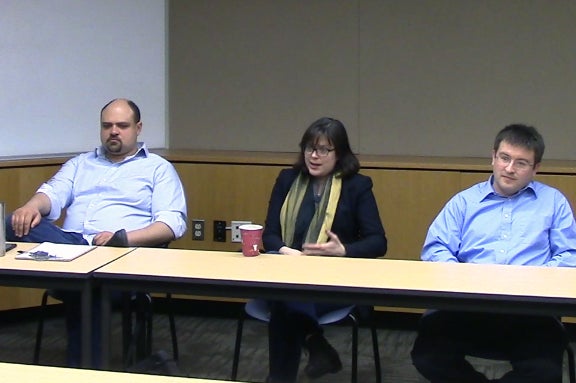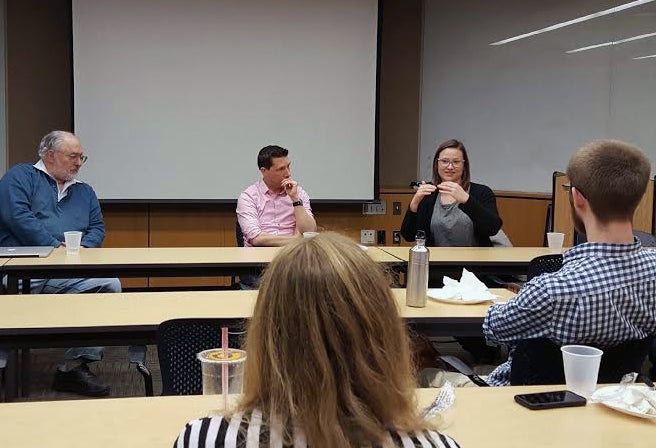Academic Laboratory Management
One of the goals of CSIE|UM is to prepare young researchers for their future faculty positions. Moving from a graduate student to postdoctoral researcher position and onto faculty positions generally results in an increase in management responsibility. Professors are not only teachers and researchers, they are also responsible for managing day-to-day operations of their research group including the financials, recruitment, hiring, training, and numerous other responsibilities. Many postdocs and grad students have little experience or training in management styles or techniques and there are a large number of different yet equally effective styles. CSIE|UM invited six UM Chemistry professors (2 from each level of professorship) to provide perspective and share their own philosophies on managing their labs in town-hall style discussions.
 The first panel, held on Friday, March 24, 2017, featured professors Charles McCrory, Pavel Nagorny, and Anna Map. This panel focused on how to handle reference letters, attracting and retaining students, graduation, and how training management. The panel offered shared and differing opinions and tips on training new students. Expectations of postdocs in terms of managerial responsibility, and the roles that postdocs play in other general lab management task, was also well discussed. The panel shared their different experiences on starting a lab and recruiting new members as an assistant professor and tips on how to keep students engaged and motivated with their research.
The first panel, held on Friday, March 24, 2017, featured professors Charles McCrory, Pavel Nagorny, and Anna Map. This panel focused on how to handle reference letters, attracting and retaining students, graduation, and how training management. The panel offered shared and differing opinions and tips on training new students. Expectations of postdocs in terms of managerial responsibility, and the roles that postdocs play in other general lab management task, was also well discussed. The panel shared their different experiences on starting a lab and recruiting new members as an assistant professor and tips on how to keep students engaged and motivated with their research.
 The second panel, held on Friday, March 31, 2017, featured professors Alison Narayran, Nate Szymczak, and Vincent Pecoraro and was more focuses on managing of motivation, conflict, and communication to and within the lab group. Again this panel often shared a general philosophy on how to manage these occasionally difficult topics, though as was highlighted in the discussion, each person is different and this impacts how to best manage individual situations. The professors agreed that trainee success requires accommodating individual needs, while maintaining clear and obtainable expectations and goals. The discussion then turned to how best to effectively communicate those expectations and how to create an environment that is productive to research. One shared example is that all of the groups expect regular communication between trainees both in group meetings and in the lab research space. Finally, the panel shared their thoughts on how best to manage conflict between group members.
The second panel, held on Friday, March 31, 2017, featured professors Alison Narayran, Nate Szymczak, and Vincent Pecoraro and was more focuses on managing of motivation, conflict, and communication to and within the lab group. Again this panel often shared a general philosophy on how to manage these occasionally difficult topics, though as was highlighted in the discussion, each person is different and this impacts how to best manage individual situations. The professors agreed that trainee success requires accommodating individual needs, while maintaining clear and obtainable expectations and goals. The discussion then turned to how best to effectively communicate those expectations and how to create an environment that is productive to research. One shared example is that all of the groups expect regular communication between trainees both in group meetings and in the lab research space. Finally, the panel shared their thoughts on how best to manage conflict between group members.
One of the common themes of these discussions is that there is no perfect managerial style that will fit with all of those you are managing. The professors shared the idea that managing must be tailored to each trainee and situation as required.

